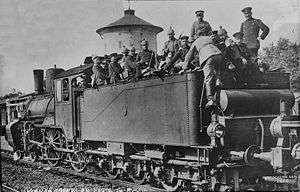Prussian P 4
| Prussian P 4 | |
|---|---|
 | |
| Quantity | 1 |
| Manufacturer | Henschel |
| Year(s) of manufacture | 1898 |
| Retired | 1921 |
| Wheel arrangement | 4-4-0 |
| Axle arrangement | 2'B h2 |
| Type | P 24.45 |
| Gauge | 1,435 mm (4 ft 8 1⁄2 in) |
| Length over buffers | 16,411 mm |
| Overall wheelbase | 7,400 mm |
| Empty weight | 44.6 t |
| Service weight | 49.1 t |
| Adhesive weight | 31.0 t |
| Axle load | 15.5 t |
| Top speed | 90 km/h |
| Indicated Power | 675 kW (900 PS) |
| Coupled wheel diameter | 1,750 mm |
| Carrying wheel diameter | 1,000 mm |
| No. of cylinders | 2 |
| Cylinder bore | 460 mm |
| Piston stroke | 600 mm |
| Boiler Overpressure | 12 bar |
| No. of heating tubes | 141 |
| No. of smoke tubes | 1 fire tube |
| Grate area | 2.32 m² |
| Radiative heating area | 8.9 m² |
| Tube heating area | 76.2 m² |
| Superheater area | 21.0 m² |
| Evaporative heating area | 85.1 m² |
| Tender | pr 3 T 15 |
| Water capacity | 15.0 m³ |
The Prussian P 4 was a derivative of the P 4.1 (Hanover variant) and the second superheated steam locomotive in the world.
Design
The engine was based on that of the Class P 4.1 that had Hanomag had produced in large numbers since 1892. It had slightly larger wheels and, due to its new design, significantly fewer heating tubes. The superheater and the steam engine were entirely independent designs.
Service and preservation
In 1898 a one-off was delivered by Hanomag to the Prussian state railways. The economy of the superheated system was soon proven in 1899 by the engine during trial runs from Kassel. Apart from a short stay at Halle the engine was assigned to Kassel as Cassel 131 and, from 1906, as P 4 Cassel 1846. In 1921, after the First World War, the engine was mothballed, along with many other machines of similar class. With its sectioned boiler the P 4 stood for a long time in the Transport and Construction Museums, part of Museum of the Present at Hamburger Bahnhof in Berlin.
See also
- Prussian state railways
- List of Prussian locomotives and railbuses
- List of preserved steam locomotives in Germany
References
- Wagner, Andreas; Bäzold, Dieter; Zschech, Rainer (1997). Lokomotiv-Archiv Preußen Band 4. Augsburg: Bechtermünz. ISBN 3-86047-573-8.
| Wikimedia Commons has media related to Prussian P 4. |